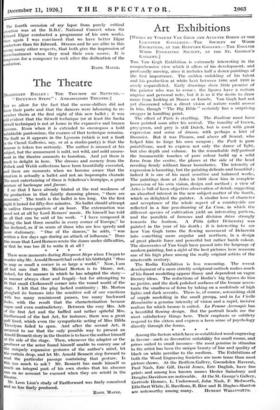The Theatre
DIAGHILEFF BALLET : THE TRIUMPH OF NEPTUNE.- " RICEYMAN STEPS" : AMBASSADORS THEATRE.] ET us allow for the fact that the scene-shifters did not now their parts and that the dancers were labouring to re- member theirs at the first night of this new ballet ; it was till evident that the Sitwell technique (or at least the Sacha dwell technique) is not at home in the expansive and brazen veeurn. Even when it is extended to encompass a bold biddable pantomime, the essence of that technique remains. he fault as it appears in the Lyceum (which is not a fault in the Chenil Galleries, say, or at a studio-party) is that the humour is taken too seriously. The author is amused at his subject, but the amusement is mild, not wild, and mild amuse- ment in the theatre amounts to boredom. And yet there is uch to delight in here. The dresses and scenery from the 'ollock and Webb collections have been beautifully executed, nd there are moments when we become aware that the creation is actually a ballet and not an impromptu charade he most entertaining of these is Sokolova's hornpipe, a great ',due of burlesque and finesse.
I see that I have already hinted at the real weakness of he production in that faintly damning phrase, " there are oments." The truth is the ballet is too long. On the first 'At it lasted for fifty-five minutes. No ballet should attempt to outlive three-quarters of an hour. The extenuation was ed not at all by Lord Berners' music. He himself has told us all that can be said of his work. " I have composed it during the last three months in every corner of Europe," he declared, as if in scorn of those who are less speedy and more stationary. " One of the dances," he adds, " was written a few days ago during an attack of influenza." Does this mean that Lord Berners wrote the dance under difficulties, or that he was too ill to write it at all ?
* * *
There were moments during Riceyrnan Steps when I began to wonder why Mr. Arnold Bennett had ceded his birthright "thus to map so small a corner in so large a world." Now, I am all but sure that Mr. Michael Morton is to blame, not, indeed, for the manner in which he has adapted the story— (a manner always clear and frugal)—but for attempting to fit that small Clerkenwell corner into the round world of the stage. I felt that the play lacked continuity ; Mr. Morton ploughed its furrows into the sensitive soil of our emotions with too many reminiscent pauses, too many backward looks, with the result that the characterization became vague and even contradictory. Between the cosy Mrs. Arb of the first Act and the baffled and rather spiteful Mrs. Earlforward of the last Act, for instance, there was a great gulf fixed, which even the sympathetic acting of Miss Hilda Trevelyan failed to span. And after the second Act, it occurred to me that the only possible way to present an Arnold Bennett story in the theatre is to have the author himself at the side of the stage. Then, whenever the adapter or the Producer or the actor found himself unable to convey one of the uniquely expansive gestures of the author's mind, let the curtain drop, and let Mr. Arnold Bennett step forward to read the particular passage containing that gesture. Is this too much to ask ? Mi. Bennett has made himself so Much an integral part of his own stories that his absence can on no account be excused when they are retold in the theatre.
Mr. Leon Lion's study of Earlforward was finely conceived and no less finely produced.
)BASIL MAINE.














































 Previous page
Previous page